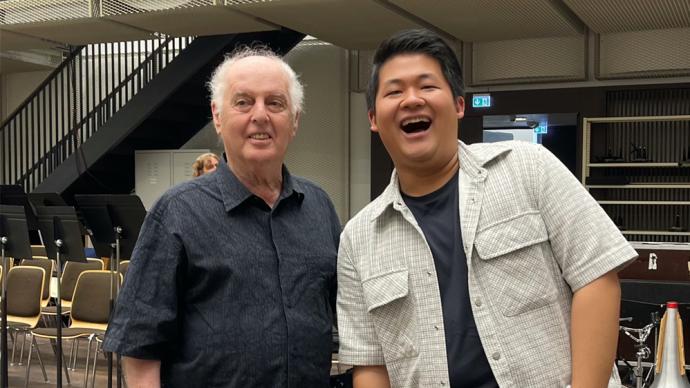
In the Berlin State Opera Orchestra with a history of more than 450 years, Zeng Yun completed the transition from horn guest principal to principal horn in less than a month.
The good news has just reached the country. At the age of 22, Zeng Yun was appointed as the Principal Horn of the Berlin State Opera Orchestra, and he is also one of the youngest principals in the orchestra's history.
Zeng Yun was selected by 80-year-old music director Daniel Barenboim. When he was interviewed by The Paper, he was preparing to start his first collaboration with Barenboim, rehearsing Tchaikovs. The Fifth Symphony and Schumann's Fourth Symphony.
Zeng Yun is currently in the first year of postgraduate studies at the Central Conservatory of Music. In October this year, he will officially move to Berlin and take office. This is also the first official job in his life.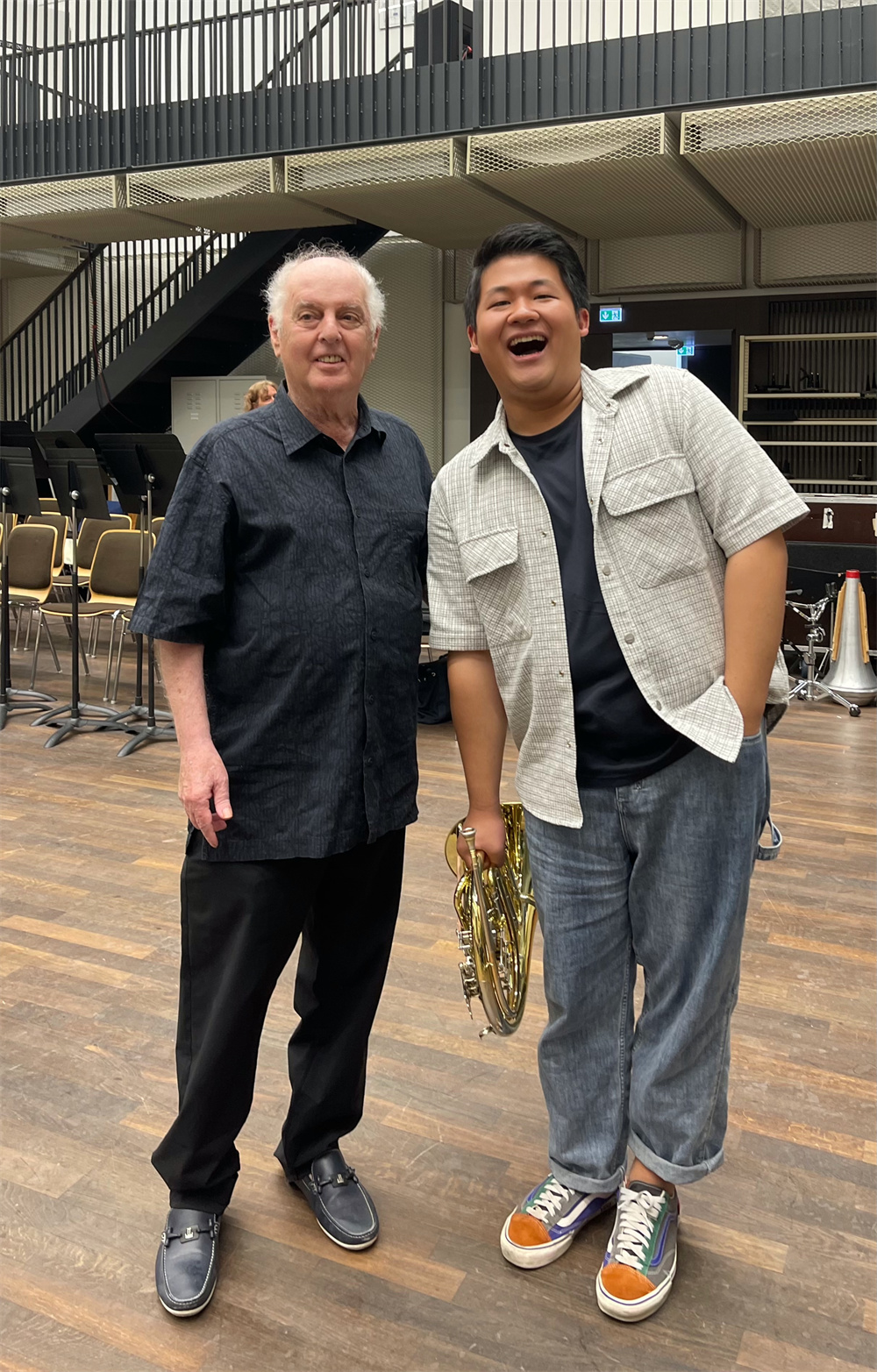
Germany is a well-known classical music powerhouse with numerous famous troupes.
The Berlin State Opera Orchestra is affiliated to the Berlin State Opera and ranks among the first-tier German orchestras alongside the Berlin Philharmonic, the Dresden State Orchestra, the Bavarian Radio Symphony, and the Munich Philharmonic.
This is one of the oldest ensembles in the world, and it has been star-studded along the way. Many masterpieces by composers such as Wagner and Mendelssohn have been premiered here, conducted by Mendelssohn, Meyerbeer, Weingartner, Richard Strauss, Furtwängler, Karajan, etc. Everyone has led the band before.
In 1992, Barenboim began as the orchestra's music director, and was awarded the "Lifetime Conductor" honor by the orchestra in 2000.
Under the aura of the champion of the Tchaikovsky International Music Competition (first place in the brass group) and the runner-up of the Munich ARD International Music Competition (the second place in the horn group), on May 10, Zeng Yun sat in as the guest principal. the orchestra. He originally planned to be a guest for two months. After rehearsing and performing several times together, the musicians were surprised by his band experience and playing state, and they suggested him to take the band exam.
"I can finally experience what a professional orchestra player is like, so I decided to give it a try." The Berlin State Opera Orchestra is notoriously difficult to take exams, with a large number of applicants and fierce competition. Barenboim-specific director assessments.
Zeng Yun also went through the director's assessment. In the presence of Barenboim, he performed Mozart's Horn Concerto No. 4, Richard Strauss' Horn Concerto No. 1, and some orchestral excerpts. With him in the final stage, there is also the chief horn from the Wupatar Symphony Orchestra.
Barenboim was in poor health and was helped into the exam room by two or three people. When he first started to play Mozart, Zeng Yun didn't recognize him. It was not until Richard Strauss that he realized that this white-haired grandfather was the master he used to see on TV.
After the exam, Zeng Yun and her orchestra colleagues stood in the hallway chatting. Barenboim walked up to him, patted him on the face lightly, and laughed. At the last moment, Barenboim cast a crucial vote, appointing Zeng Yun as chief horn.
In less than a month, Zeng Yun broke into this orchestra with an average age of about 45 years old, and shared the important responsibility of the horn with another senior musician. There are currently 9 musicians in the horn section, all of whom perform their duties, and the oldest one is 63 years old.
In the field of horns, Germany is as strong as a forest. The key to being able to stand out, in Zeng Yun's opinion, is to see whether his playing conforms to their aesthetics and the tonality of the orchestra - this old orchestra with a history of more than 450 years has a proud musical tradition. The hands have inherited the tradition from their predecessors, and when injecting new blood, they also want to see if the new colleagues can take up this tradition.
Holding a lifetime contract, almost every musician has decades of work experience. "Everyone is very experienced. I am the same as the little white rabbit." Zeng Yun said with a smile.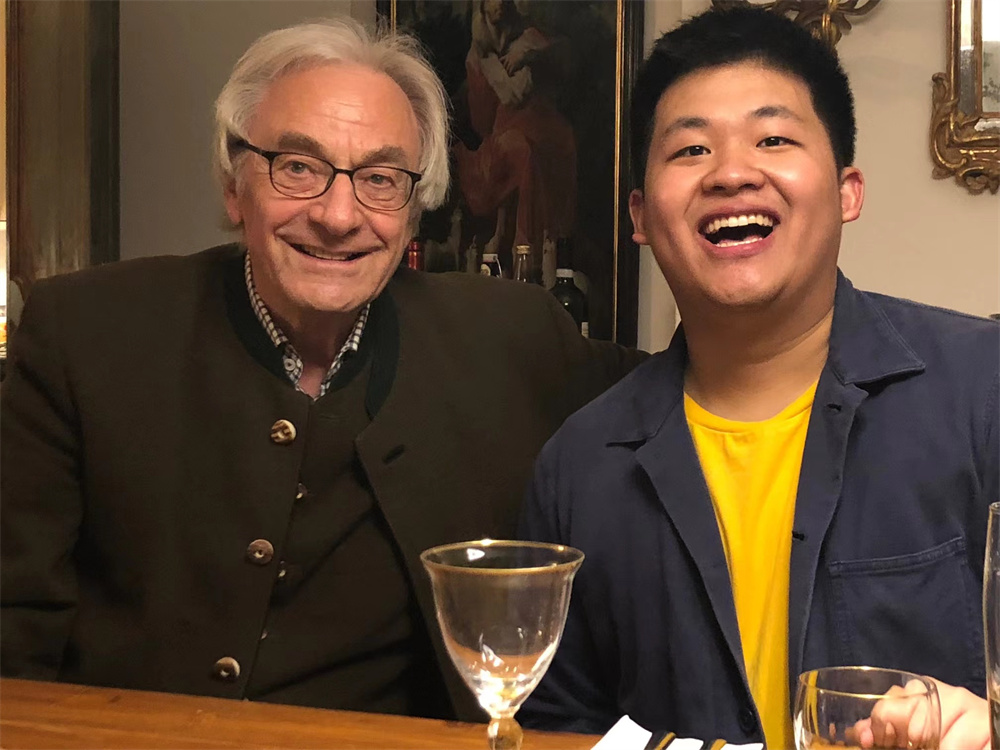
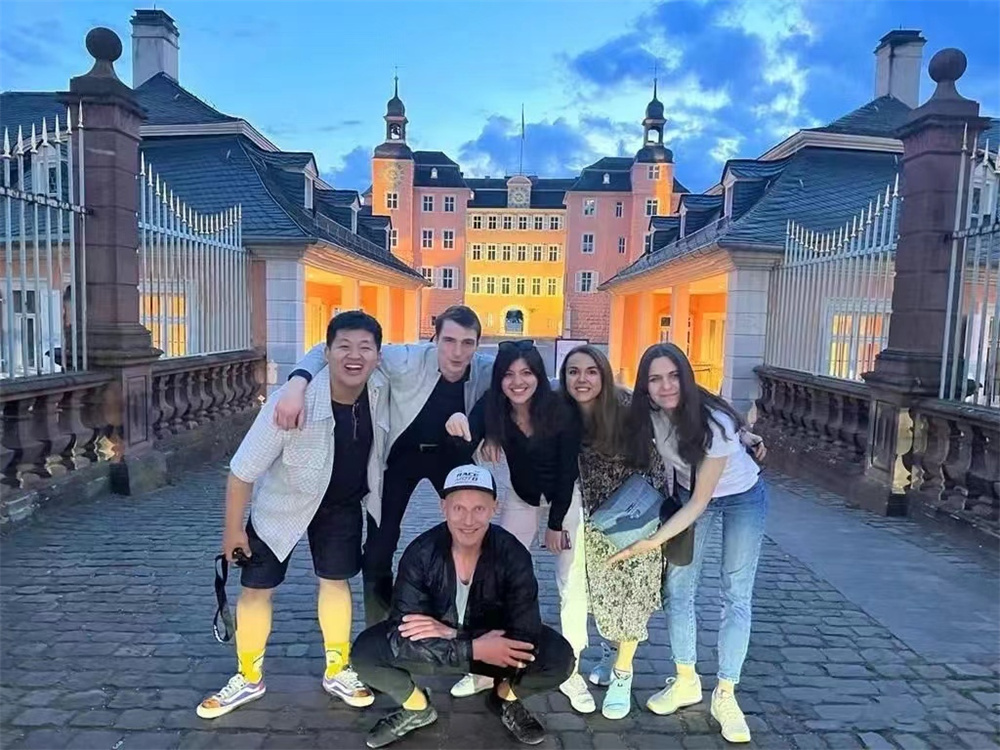
Zeng Yun, who was born in 1999, is not the only Chinese figure in the orchestra. Zhu Lifan, a "post-90s" girl from Shanghai, is working as the principal two piano.
There are many Chinese performers in the world's famous classical troupes. Today, this "Chinese Legion" that is fighting overseas is getting younger and younger. In February of this year, Mediyan, who was born in 1994, knocked on the door of the Berlin Philharmonic Orchestra and took the position of principal viola, becoming the first Chinese musician to join the orchestra in 140 years.
In the international music competition, the performance of Chinese players is also outstanding. In the just-concluded Queen Elizabeth Music Competition, Chen Yibai, who was born in 2001, won the runner-up in the cello group. The Van Cliburn International Piano Competition is in full swing. Sun Yutong, born in 1995, entered the semi-finals.
They all went from Chinese universities to the world. Zhu Lifan once studied at the High School Attached to the Shanghai Conservatory of Music, while Zeng Yun, Mei Diyang and Sun Yutong are from the Central Conservatory of Music. Zeng Yun, who was born in a family of horns, was thoroughly cultivated locally and made in China. So far, she has never studied in an overseas institution.
"We have too many outstanding talents, with good skills and a good understanding of music, which fully meets the requirements of foreign orchestras." With black hair, yellow skin and Chinese identity, Zeng Yun also has many friends around Germany takes the band exam, and when it comes to the final stage, where two or three competitors are fighting, the other party tends to vote that vote for the Germans.
"We are not bad professionally, but sometimes there is only a cultural gap." Zeng Yun described to reporters that German musicians also have cultural anxiety, and also worry about communication difficulties. They are afraid of awkwardness and work with Germans. Apparently there is no such trouble.
Zeng Yun is always cheerful, and naturally it is easy to get close to people and have a good impression. In addition, he has the advantage of German, and the communication is barrier-free. The other party has the opportunity to understand himself, and he also feels his respect for German culture.
Before participating in the ARD competition in September last year, Zeng Yun had learned German sporadically, and the real breakthrough came from the help of a distinguished person.
After the ARD competition, Zeng Yun participated in the concert of the winners. The concert was broadcast to thousands of households in Germany, and also to the ears of an old grandfather. During the interview, Zeng Yun bluntly said that she hopes to communicate in German next time. The grandfather happened to be teaching German at the university, and his wife once worked in the Bavarian Radio Symphony Orchestra, so he went to the mailbox of the person in charge of the competition and expressed his willingness to teach the Chinese guy for free.
"It's such a lovely thing to be able to learn German with Germans!" The two young friends started online teaching, playing Zoom once a week for two hours at a time. The 81-year-old professor uses the cloud video software, which is more slippery than Zeng Yun. The two of them used English at first, and then they all jumped out to German, and the class was like chatting at home. When she came to Germany this time, Zeng Yun made a special trip to meet the old professor, had a meal, took a group photo, and had a great time.
The intimate and intuitive communication provided a solid foundation for Zeng Yun to learn German and understand German culture. "Learning a language is really a bottomless pit. I just touched the door and heard the accent." Zeng Yun hid the goal of in-depth study of German culture in his heart. As a bridge to German culture, he is confident to use German Down.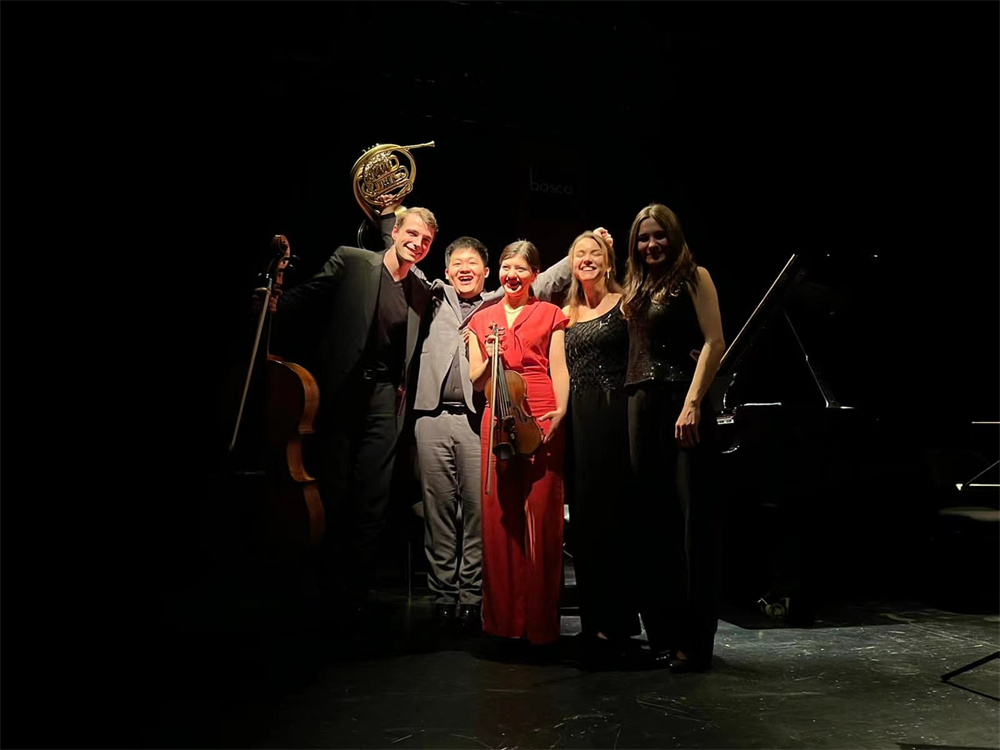
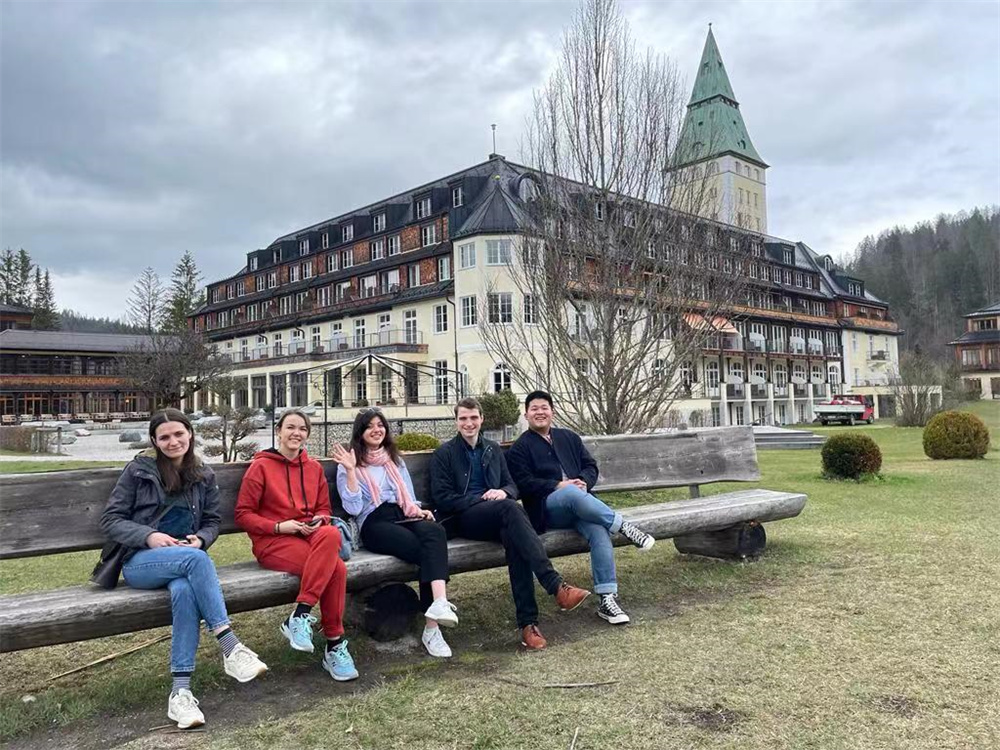
The Berlin State Opera Orchestra is an "amphibious" ensemble, with a mix of opera and concert performances, with opera accounting for 60%.
Opera is unfamiliar territory for Zeng Yun. Since joining the group for more than a month, he has performed operas every week, from Janacek's "Yenufa" to Puccini's "Western Girl", he stepped into the world of opera and began to accept systematic, In-depth opera baptism.
"The performance of an opera is very long, and we have to hear it from the beginning to the end. Sometimes there are not many horn scenes, and one or two sounds come out suddenly. Whether it is tone or taste, it must meet the needs of the plot." Before that, Zeng Yun only He played several operas at the National Centre for the Performing Arts in Beijing, such as Wagner's "The Folk Singer of Nuremberg."
When interviewed by reporters, Zeng Yun was preparing for his first symphony concert at the Berlin State Opera Orchestra. This is an open-air summer concert, conducted by Barenboim himself, and includes Tchaikovsky's Fifth Symphony and Schumann's Fourth Symphony. Next week, he will rehearse Bruckner's Seventh Symphony under the swing of Herbert Blomstadt, with two performances at the Berlin State Opera and the Berlin Philharmonic.
After her last performance in Germany in early July, Zeng Yun will be on vacation. He will fly non-stop to Tokyo, Japan, and hold a trio concert with Kuroiwa Koki and Takamatsu Ai, and a duet concert with Kyosho Shushi, playing the horn to the fullest. After finishing her trip to Japan in mid-August, Zeng Yun will return home to prepare for a series of performances in Xi'an, Beijing, Zhuhai, Macau and other places in early autumn.
A busy international performance career seems to be underway. Zeng Yun enjoys this kind of busyness, playing chamber music with the ensemble group, and playing symphonies with the band. When someone moves his toes, he knows what the other party wants to do. After the performance, everyone will drink some beer and eat some skewers together... ...this taste makes him feel happy.
Of course, he also likes to play solo, but the collective strength seems to be warmer. "Solo is very lonely. Especially on tour, when you migrate from one place to another, although you can make friends, you always feel that you are fighting alone."
In October, Zeng Yun will officially move to Berlin, which is also the first official job in his life.
How can I balance my studies at the Central Conservatory of Music? Zeng Yun is not worried. In recent years, the school's online course system and online teaching have become more and more perfect. When he is in Berlin, he will connect with the hot spring teacher in Beijing and continue his studies through online courses.
"For so many years in China, I have been in a 'baby'. This is the first time I have lived abroad for a long time." After breaking away from the previous care and suddenly entering a strange environment, Zeng Yun is frank and psychologically aware. There is a little impact, "There will be challenges in the future, but I am more looking forward to it."
The good news has just reached the country. At the age of 22, Zeng Yun was appointed as the Principal Horn of the Berlin State Opera Orchestra, and he is also one of the youngest principals in the orchestra's history.
Zeng Yun was selected by 80-year-old music director Daniel Barenboim. When he was interviewed by The Paper, he was preparing to start his first collaboration with Barenboim, rehearsing Tchaikovs. The Fifth Symphony and Schumann's Fourth Symphony.
Zeng Yun is currently in the first year of postgraduate studies at the Central Conservatory of Music. In October this year, he will officially move to Berlin and take office. This is also the first official job in his life.

After the rehearsal, Zeng Yun and Barenboim took a group photo.
Fresh blood from ChinaGermany is a well-known classical music powerhouse with numerous famous troupes.
The Berlin State Opera Orchestra is affiliated to the Berlin State Opera and ranks among the first-tier German orchestras alongside the Berlin Philharmonic, the Dresden State Orchestra, the Bavarian Radio Symphony, and the Munich Philharmonic.
This is one of the oldest ensembles in the world, and it has been star-studded along the way. Many masterpieces by composers such as Wagner and Mendelssohn have been premiered here, conducted by Mendelssohn, Meyerbeer, Weingartner, Richard Strauss, Furtwängler, Karajan, etc. Everyone has led the band before.
In 1992, Barenboim began as the orchestra's music director, and was awarded the "Lifetime Conductor" honor by the orchestra in 2000.
Under the aura of the champion of the Tchaikovsky International Music Competition (first place in the brass group) and the runner-up of the Munich ARD International Music Competition (the second place in the horn group), on May 10, Zeng Yun sat in as the guest principal. the orchestra. He originally planned to be a guest for two months. After rehearsing and performing several times together, the musicians were surprised by his band experience and playing state, and they suggested him to take the band exam.
"I can finally experience what a professional orchestra player is like, so I decided to give it a try." The Berlin State Opera Orchestra is notoriously difficult to take exams, with a large number of applicants and fierce competition. Barenboim-specific director assessments.
Zeng Yun also went through the director's assessment. In the presence of Barenboim, he performed Mozart's Horn Concerto No. 4, Richard Strauss' Horn Concerto No. 1, and some orchestral excerpts. With him in the final stage, there is also the chief horn from the Wupatar Symphony Orchestra.
Barenboim was in poor health and was helped into the exam room by two or three people. When he first started to play Mozart, Zeng Yun didn't recognize him. It was not until Richard Strauss that he realized that this white-haired grandfather was the master he used to see on TV.
After the exam, Zeng Yun and her orchestra colleagues stood in the hallway chatting. Barenboim walked up to him, patted him on the face lightly, and laughed. At the last moment, Barenboim cast a crucial vote, appointing Zeng Yun as chief horn.
In less than a month, Zeng Yun broke into this orchestra with an average age of about 45 years old, and shared the important responsibility of the horn with another senior musician. There are currently 9 musicians in the horn section, all of whom perform their duties, and the oldest one is 63 years old.
In the field of horns, Germany is as strong as a forest. The key to being able to stand out, in Zeng Yun's opinion, is to see whether his playing conforms to their aesthetics and the tonality of the orchestra - this old orchestra with a history of more than 450 years has a proud musical tradition. The hands have inherited the tradition from their predecessors, and when injecting new blood, they also want to see if the new colleagues can take up this tradition.
Holding a lifetime contract, almost every musician has decades of work experience. "Everyone is very experienced. I am the same as the little white rabbit." Zeng Yun said with a smile.

Zeng Yun took a group photo with the German teacher.

Zeng Yun is in Germany, and he is still a photography enthusiast with a camera in his hand.
Bridging cultural barriers is criticalZeng Yun, who was born in 1999, is not the only Chinese figure in the orchestra. Zhu Lifan, a "post-90s" girl from Shanghai, is working as the principal two piano.
There are many Chinese performers in the world's famous classical troupes. Today, this "Chinese Legion" that is fighting overseas is getting younger and younger. In February of this year, Mediyan, who was born in 1994, knocked on the door of the Berlin Philharmonic Orchestra and took the position of principal viola, becoming the first Chinese musician to join the orchestra in 140 years.
In the international music competition, the performance of Chinese players is also outstanding. In the just-concluded Queen Elizabeth Music Competition, Chen Yibai, who was born in 2001, won the runner-up in the cello group. The Van Cliburn International Piano Competition is in full swing. Sun Yutong, born in 1995, entered the semi-finals.
They all went from Chinese universities to the world. Zhu Lifan once studied at the High School Attached to the Shanghai Conservatory of Music, while Zeng Yun, Mei Diyang and Sun Yutong are from the Central Conservatory of Music. Zeng Yun, who was born in a family of horns, was thoroughly cultivated locally and made in China. So far, she has never studied in an overseas institution.
"We have too many outstanding talents, with good skills and a good understanding of music, which fully meets the requirements of foreign orchestras." With black hair, yellow skin and Chinese identity, Zeng Yun also has many friends around Germany takes the band exam, and when it comes to the final stage, where two or three competitors are fighting, the other party tends to vote that vote for the Germans.
"We are not bad professionally, but sometimes there is only a cultural gap." Zeng Yun described to reporters that German musicians also have cultural anxiety, and also worry about communication difficulties. They are afraid of awkwardness and work with Germans. Apparently there is no such trouble.
Zeng Yun is always cheerful, and naturally it is easy to get close to people and have a good impression. In addition, he has the advantage of German, and the communication is barrier-free. The other party has the opportunity to understand himself, and he also feels his respect for German culture.
Before participating in the ARD competition in September last year, Zeng Yun had learned German sporadically, and the real breakthrough came from the help of a distinguished person.
After the ARD competition, Zeng Yun participated in the concert of the winners. The concert was broadcast to thousands of households in Germany, and also to the ears of an old grandfather. During the interview, Zeng Yun bluntly said that she hopes to communicate in German next time. The grandfather happened to be teaching German at the university, and his wife once worked in the Bavarian Radio Symphony Orchestra, so he went to the mailbox of the person in charge of the competition and expressed his willingness to teach the Chinese guy for free.
"It's such a lovely thing to be able to learn German with Germans!" The two young friends started online teaching, playing Zoom once a week for two hours at a time. The 81-year-old professor uses the cloud video software, which is more slippery than Zeng Yun. The two of them used English at first, and then they all jumped out to German, and the class was like chatting at home. When she came to Germany this time, Zeng Yun made a special trip to meet the old professor, had a meal, took a group photo, and had a great time.
The intimate and intuitive communication provided a solid foundation for Zeng Yun to learn German and understand German culture. "Learning a language is really a bottomless pit. I just touched the door and heard the accent." Zeng Yun hid the goal of in-depth study of German culture in his heart. As a bridge to German culture, he is confident to use German Down.

Beginning at the end of April, Zeng Yun will participate in the ARD competition winners tour in Germany, together with the 2019 and 2021 ARD competition winners, including a cello, a violin and a pair of pianos.

A group photo of Zeng Yun and her tour partners
Step into the world of operaThe Berlin State Opera Orchestra is an "amphibious" ensemble, with a mix of opera and concert performances, with opera accounting for 60%.
Opera is unfamiliar territory for Zeng Yun. Since joining the group for more than a month, he has performed operas every week, from Janacek's "Yenufa" to Puccini's "Western Girl", he stepped into the world of opera and began to accept systematic, In-depth opera baptism.
"The performance of an opera is very long, and we have to hear it from the beginning to the end. Sometimes there are not many horn scenes, and one or two sounds come out suddenly. Whether it is tone or taste, it must meet the needs of the plot." Before that, Zeng Yun only He played several operas at the National Centre for the Performing Arts in Beijing, such as Wagner's "The Folk Singer of Nuremberg."
When interviewed by reporters, Zeng Yun was preparing for his first symphony concert at the Berlin State Opera Orchestra. This is an open-air summer concert, conducted by Barenboim himself, and includes Tchaikovsky's Fifth Symphony and Schumann's Fourth Symphony. Next week, he will rehearse Bruckner's Seventh Symphony under the swing of Herbert Blomstadt, with two performances at the Berlin State Opera and the Berlin Philharmonic.
After her last performance in Germany in early July, Zeng Yun will be on vacation. He will fly non-stop to Tokyo, Japan, and hold a trio concert with Kuroiwa Koki and Takamatsu Ai, and a duet concert with Kyosho Shushi, playing the horn to the fullest. After finishing her trip to Japan in mid-August, Zeng Yun will return home to prepare for a series of performances in Xi'an, Beijing, Zhuhai, Macau and other places in early autumn.
A busy international performance career seems to be underway. Zeng Yun enjoys this kind of busyness, playing chamber music with the ensemble group, and playing symphonies with the band. When someone moves his toes, he knows what the other party wants to do. After the performance, everyone will drink some beer and eat some skewers together... ...this taste makes him feel happy.
Of course, he also likes to play solo, but the collective strength seems to be warmer. "Solo is very lonely. Especially on tour, when you migrate from one place to another, although you can make friends, you always feel that you are fighting alone."
In October, Zeng Yun will officially move to Berlin, which is also the first official job in his life.
How can I balance my studies at the Central Conservatory of Music? Zeng Yun is not worried. In recent years, the school's online course system and online teaching have become more and more perfect. When he is in Berlin, he will connect with the hot spring teacher in Beijing and continue his studies through online courses.
"For so many years in China, I have been in a 'baby'. This is the first time I have lived abroad for a long time." After breaking away from the previous care and suddenly entering a strange environment, Zeng Yun is frank and psychologically aware. There is a little impact, "There will be challenges in the future, but I am more looking forward to it."
Related Posts